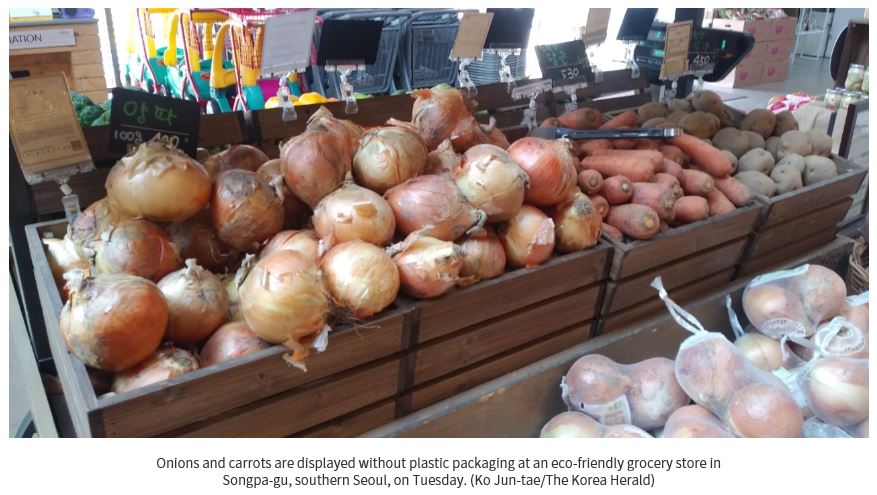
The zero-waste movement has been growing globally with increasing public interest toward a sustainable lifestyle with less reliance on extra packaging.
Yet South Korea remains largely unprepared to accommodate the eco-friendly mindset at least in terms of shopping for groceries, as most supermarkets, retailers and stores are yet to step away from single-use plastic bags and packaging for their fresh produce and protein options.
When The Korea Herald visited grocery stores of varying sizes in Seoul throughout the day on Tuesday, most stores were found to be unable to accommodate shoppers looking to buy products without plastic.
“What do you mean, you have your own container?” asked an employee stationed at the fisheries section of a hyperstore grocery chain in Seongdong-gu, eastern Seoul, when a reporter asked to buy a mackerel in a reusable container.
“I mean, here is the mackerel right in front of you. Just take one from there.”
None of the three major retail store chains in Seoul that The Korea Herald visited Tuesday had any unwrapped meat or fisheries products available on their shelves. At best, it took minutes of uncomfortable conversation to have cuts of meat provided without plastic and styrofoam packaging.
“I have seen on the news that some people try to take fewer plastic bags or that sort of thing, but I haven’t seen anyone trying to do this here,” said an employee at a retail chain in Songpa-gu, southern Seoul, who has been stationed at the meat section for six months.
Most of the fresh produce lined up at these stores already came wrapped in plastic, and it was hard to find a product displayed without any covering. Stickers printed with barcodes and price tags were put over the plastic wrap, so checking out could be more difficult without it.
Waste-free grocery shopping was closer to reality at traditional markets, as most of the fresh produce and fisheries goods were displayed without being covered in plastic. Merchants were more open to having shoppers store their goods in their own containers, but still questioned why.
“Isn’t it heavy to carry all those boxes around? You can just take the plastic bag. I won’t charge for it,” a fruit seller at a traditional market in Songpa-gu said while taking cash for tangerines.
“I’ve seen a few people like you before, and I think that’s good. We have too much garbage lying around. But I don’t think we are ready to really bring that to our real lives.”
Environment activists share this view, saying the zero-waste movement is far from coming to reality in terms of everyday lives. Shopping for groceries without extra trash is simply impossible, they say, as the market for it is miniscule, with a slow pace of growth.
“We simply don’t have options to go waste-free when shopping for groceries, and while we have seen some successful cases from overseas, this is something not really a part of Korea at this moment,” said Heo Seung-en, an activist at Green Korea.
“Thankfully, more and more people are becoming aware of the waste issue, and they are trying to cut the amount of waste produced in their daily lives. But there’s not much support from the private sector and the government on issues like this.”
Heo said the government should introduce benefits and regulatory support for grocery stores to use less plastic, which will help people quickly adjust to living with less waste.
The Ministry of Environment understands that the waste-free lifestyle is far from becoming reality among Koreans, saying the country is at the very early stage of promoting sustainability in everyday lives and that more awareness is needed among people.
In 2020, the ministry certified two grocery stores in Seoul with eco-labels for their work to minimize the amount of waste produced. The ministry plans to add two more to its list this year, preferably in wealthy neighborhoods of the capital region.
“We are trying to expand the campaign in a way that zero-waste grocery shopping is a popular trend among rich people, so we are looking for options in wealthy residential areas,” a ministry official said.
“People tend to pay attention to what rich people do, and this could be a way for us to spread the zero-waste movement more closely to the general public.”
By Ko Jun-tae (ko.juntae@heraldcorp.com)
http://www.koreaherald.com/view.php?ud=20210324001151&np=1&mp=1